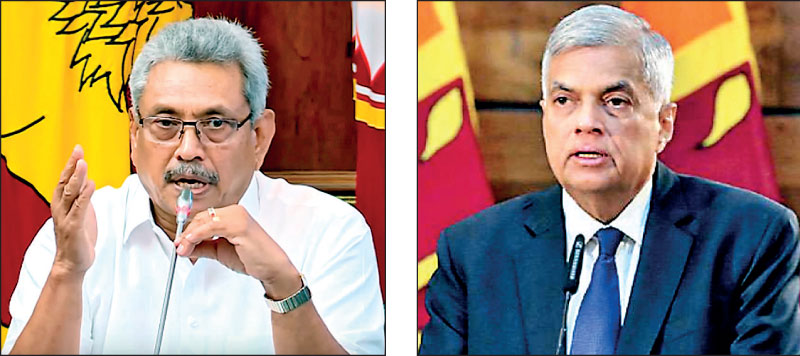Friday Feb 20, 2026
Friday Feb 20, 2026
Thursday, 2 June 2022 01:34 - - {{hitsCtrl.values.hits}}

Yes, it is politically advantageous for the President to appoint RW as the PM, but it is advantageous for the country as well. We should not have any issue with it if we are looking at the problem in the perspective of the country
 The disastrous situation faced by the country today is aggravated by the different responses to it by the different political parties. Their responses are based on how they look at the problem. Their perspective is based on capturing or keeping their power in the country. In fact, that is the purpose of their existence. However, this perspective provides a long-term self-centric solution which is not the need of the hour. We need a quick, people-centric solution which may have adverse effects to those political parties. Unfortunately, not only the political parties but also the people who are affiliated to those political parties look at the problem in the same respective perspectives. Hence, we have chaos in the Parliament.
The disastrous situation faced by the country today is aggravated by the different responses to it by the different political parties. Their responses are based on how they look at the problem. Their perspective is based on capturing or keeping their power in the country. In fact, that is the purpose of their existence. However, this perspective provides a long-term self-centric solution which is not the need of the hour. We need a quick, people-centric solution which may have adverse effects to those political parties. Unfortunately, not only the political parties but also the people who are affiliated to those political parties look at the problem in the same respective perspectives. Hence, we have chaos in the Parliament.
It is a known and well-discussed fact that the President and the persons appointed by him are responsible for this manmade disaster. The President admitted it. It was bad management as confirmed by the Managing Director of IMF recently. Then it turned to an economic problem and now it is a political problem.
In his address to the nation on 11 May 2022, he stated as follows: “Steps will be taken to amend the Constitution to re-enact the contents of the 19th Amendment to further empower the Parliament.” He also said he would hold discussions on abolition of the Executive Presidency, which is among the main demands of the protesters.
This was the road map of the President who was utterly unpopular at the time he made this address, and this was in line with the proposals of the Bar Association of Sri Lanka (BASL). Therefore, he should abide by it, not for anything else but for securing an honourable exit for him.
The reason for bringing back the 19th Amendment to the Constitution, of cause with the elimination of the deficiencies experienced in that legislature, is to ensure that the President has no such authority to meddle with the affairs of governance since it was that very authority which dragged the country to this level. Also, this is not the time to go for a referendum and abolish the executive presidency all together. There is a timeframe to it as suggested by the BASL and indicated by the President. Of course, a commitment should be obtained from him.
Therefore, if any political party insists that the economic problem should be resolved first prior to the constitutional issues, as claimed by SLPP or Presidential system should be abolished now after having a referendum as claimed by SJB or that they should not support these underhand deals as claimed by JJB, they are looking at the problem not on national perspective but on their own political perspective. As the citizens we should condemn all these viewpoints.
Our house is burning today. First, we should get out of it and then try to extinguish the fire. As Bertolt Brecht once said we should not keep asking whether the outside is windy or raining prior to getting out of the house.
The problem at hand is not to punish the President, although he should be punished. First, we have to save the country and then look at the rest. We need political stability to seek IMF assistance, so as any assistance from any country. That is why an interim government is needed with the support of all in the Parliament. A government appointed after an election with very high majority will not address the problems we face. We have experience in this respect. Both 17th and 19th Amendments to the Constitution were passed by the minority governments.
The President tried to appoint Sajith Premadasa as the Prime Minister (PM) but he declined. He demanded that the President should resign. Then the President appointed Ranil Wickremesinghe (RW) as the PM. If RW did not accept the post the President would have been in trouble. He may have resigned, or he may have opted for a military solution. A person with this type of mentality is capable of doing anything. The result would be a free fall of the country. Eventually he also would be out of the power. Is the President worth that much to get him out on one hand and allow a free fall of the country on the other hand? No, he is not.
Yes, it is politically advantageous for the President to appoint RW as the PM, but it is advantageous for the country as well. We should not have any issue with it if we are looking at the problem in the perspective of the country. Otherwise, we have an issue. It is also politically advantageous for RW as well taking the risk and getting appointed the PM but once again it is beneficial to the country.
If any other party does not support for the ongoing political process, it would be disastrous to the country but on the advantage of that political party. Therefore, as citizens we should oppose such moves.
RW is having a bad reputation for saving the Rajapaksas from the punishments. His current Minister of Justice once claimed that he intentionally did so. Therefore, it is the duty of the opposition parties to get involved in this political process and make sure that it is transparent. That is the duty of a responsible opposition rather than blaming the government and keeping away from the process.
It should also be emphasised that the protest movement at Gota-Go-Gama should be kept intact. Citizens should support the process until our end result of having a totally new political culture and getting implemented the economic reforms that were long overdue which contributed to the present disaster.
The new political culture should comprise of a totally new constitution by the people which provides the recalling power of the elected members to the voters and thereby creating a new Republic. Provisions should be there to minimise the corruption of the politicians and that of the public servants and all of them should be kept at the level of servants of the people not the masters.
Economic reforms should be comprising of reducing the budget deficit by increasing the revenue and decreasing the expenditure and reducing the current account deficit by having more exports than imports while minimising the inequality of income distribution. Policies should be pragmatic and not based on different ideologies and fighting with one another to defend those.
It is in this light that we should examine the recent proposals of the PM of governance. He proposed two additional committees in addition to the existing three financial committees of the Parliament and 10 oversight committees under the standing order 111. He also emphasised that the chairpersons of these committees should be appointed by the backbenchers of the Parliament and not by the Ministers. Then he proposed to appoint four youth representatives to each of these 15 committees. One from the Youth Parliament. The other three from the protesting groups and other activist groups. In addition, there will be people with expertise in specific fields in this work, appointed to the committees. Establishing these committees is in line with the proposals of the BASL and it goes beyond those proposals. These committees as hitherto practiced will not be limited to the MPs.
He also suggested to have a National Council comprising of the Speaker, the Prime Minister, the Leader of the Opposition and the leaders of the major parties. It can summon the Cabinet of Ministers and the Chairmen of Committees. National Council and the Committees should report to the Parliament. Therefore, it is a remedy to the governance lapses which contributed to the present disaster faced by the country.
Members of Parliament and the political parties should give serious consideration for these out of the box proposals which type of ones are the need of the hour.